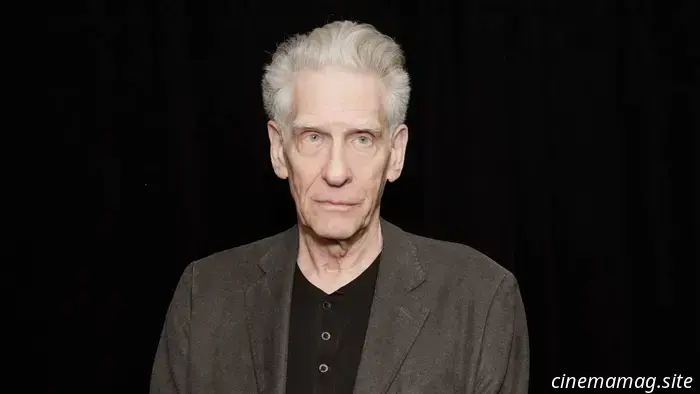
"Every Grief is Distinct": David Cronenberg Discusses The Shrouds, Life Beyond Narrative, and Transforming iPhones into Cinematic Experiences
If there's one aspect that sets directors apart from auteurs, it might be their ability to infuse themselves into the film. Few contemporary directors have established their identity as distinctly as David Cronenberg, which can lead to mixed expectations. This sets the stage for unexpected moments—like the silence that fell over a sold-out New York Film Festival audience as they realized Cronenberg's latest film, The Shrouds, deviates from the tone of Videodrome or Scanners, presenting instead a raw exploration of grief and loss, intertwined with doppelgängers, futuristic technology, and intricate conspiracy narratives.
Ultimately, The Shrouds could very well rank among Cronenberg's finest works. I spoke with him roughly 12 hours after its U.S. debut, with the film's themes still fresh in my mind, attempting—unsuccessfully—to pose questions free of admiration and observation. Nevertheless, The Shrouds provides ample material for discussion, and Cronenberg is candid about a film that reveals something significant.
The Film Stage: I finally watched the film last night.
David Cronenberg: Oh, it was a good screening.
A fantastic experience.
Yes, I mentioned in the Q&A after Cannes that the audience there didn’t fully grasp all the humor. It felt a bit odd, though understandable, given the language barrier with subtitles and the pressure people feel at Cannes. I sensed they might have thought it disrespectful to laugh. So, they hesitated. [Laughs] However, Toronto and here felt more in line with my expectations.
The audience really appreciated the line about “turning me on so much intellectually, psychologically.” Sharing that laugh with others is truly special.
[Laughs] That’s kind.
I genuinely don’t want to come across as insincere when I say it was deeply moving for me.
Thank you. That’s a very valid response, and I’m glad [Laughs] you had that reaction.
It taps into emotional tones I've not quite seen depicted before.
Yes, I think that's accurate. Not to boast, but I haven't witnessed anything quite like it. When my wife passed away, I read many popular grief books, including those by Joan Didion and C.S. Lewis, along with several others. None of them resonated with me in that specific way. Didion’s work is rather detached; she hardly touches upon the absence of her husband's body, focusing instead on missing his voice. At that time, I came to believe that all grief is unique, as unique as the individuals and their relationships involved. Thus, you can’t compare your grief to another's experience, which makes it oddly special.
I know there was a version of this project that had Léa Seydoux in the roles Diane Kruger ended up taking. I imagine the film doesn’t miss a beat—she’s incredible in those multiple roles you’ve given her.
Yes.
I wonder, since it seems like a demanding role for an actor, did your vision of these characters and the film’s emotional tone shift at all when transitioning from Seydoux to Kruger?
Oh, yes. It would have certainly changed. For starters, Léa is considerably younger, creating a larger age gap with Vincent, making Diane a more fitting match for that role. I love working with Léa; we had a great rapport on Crimes. The shift was immediate. Léa would have spoken with an accent, while Diane managed to deliver her lines without one, which is quite impressive and challenging. But that’s the nature of filmmaking and casting. Léa and I remain fond of each other and wish to collaborate again. However, at that time, she had just completed five films in a row and felt burned out, needing time with her son. That was the situation.
There are thematic connections between Crimes of the Future and The Shrouds. During the Q&A last night, you addressed a question I had regarding the absence of your long-time cinematographer Peter Suschitzky.
Yes.
Given the co-production complexities, there were some concerns about Crimes due to your longstanding collaboration with Suschitzky. Yet upon watching it, the new creative partnership with Douglas Koch feels seamless.
Yes.
The same holds true for The Shrouds. I’m curious about your experience with a new cinematographer. It seems you maintain significant control over the film's visual style.
Oh, absolutely. Doug is quite different from Peter. He’s younger, but not by much, and he embodies a very Toronto creativity compared to Peter’s distinctly British style. Doug was aware of the work Peter produced—not that he was trying to replicate it; it’s a whole different approach. Everything starts with production design and costumes before delving into lighting. I have substantial input during the scene development regarding lighting.
One advantage of digital filmmaking is that you can see the lighting on the monitor as you go.
With film, and I know film enthusiasts cherish it, I personally find

Andere Artikel
"Every Grief is Distinct": David Cronenberg Discusses The Shrouds, Life Beyond Narrative, and Transforming iPhones into Cinematic Experiences
If there is one key difference between directors and auteurs, it could be their ability to inject their personal vision into the film. Few contemporary directors have established their identity as distinctly as David Cronenberg, and while this leads to expectations that may result in mixed reactions, it also provides a greater chance to astonish––like a sold-out
